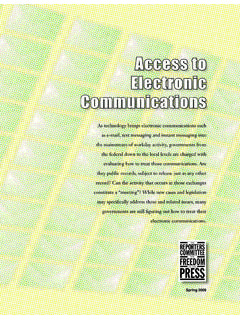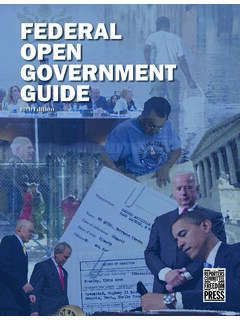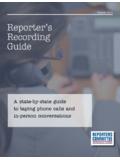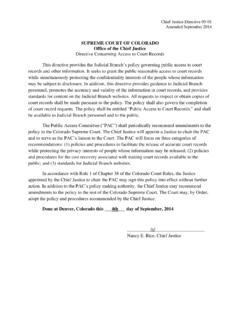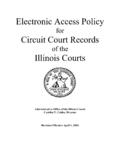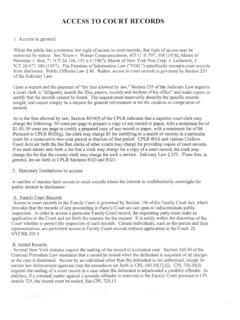Transcription of electronic access to court records - A 501(c)(3) nonprofit ...
1 electronic access to court recordsThe Reporters Committee for Freedom of the PressInformation contained in court re-cords is of vital public interest. court records consistently have proven to be a critical source of information for the public, and allowing remote electronic access to court records provides even greater access to courts is crucial in order to allow the public to effec-tively follow court cases and oversee the workings of the judicial system. court records are often essential to understanding court proceedings.
2 Journalists, lawyers, social scientists, watchdog groups and others use this information to investigate cases and analyze various aspects of the justice system, such as prosecutorial abuse of power or police insideSpring 20072 The RepoRTeRs CommiTTee foR fReedom of The pRess spRing 2007 SPECIAL REPORTThe outcome of and the information discovered during litigation often have far-reaching impact beyond just the parties named in the case. In many instances, litigation affects the greater public. Medical malpractice lawsuits can reveal the flaws of certain doctors, hospi-tals, and the health care system as a whole.
3 Environmental cases can show haphazard environmental practices of a company or ineffective governmental oversight that may negatively impact the environment. The trial of a child-molesting teacher might demonstrate that schools need to do more to protect children. Allowing readily available remote electronic access to court records increases the ability of the public to learn such information. It is a well-established principle that court records are presumed to be open to the public. Courts in the United States have recognized both a common law right and a First Amendment right to judicial records of court proceedings.
4 The Supreme court recognized a qualified common law right to inspect and copy public records and documents, including judicial records and documents, in Nixon v. Warner Communications, Inc. in 1978. The court wrote that the right is justified by the citizen s desire to keep a watchful eye on the work-ings of public agencies .. and in a newspaper publisher s intention to publish information concerning the operation of government. In Richmond Newspapers, Inc. v. Virginia (1980), and its progeny, the Supreme court established that there is a First Amendment right of public access to criminal proceedings.
5 Many lower courts have ex-tended this reasoning to hold that there is a First Amendment-based right of access to judicial records in criminal proceedings as example, in Globe Newspaper Co. v. Pokaski (1st ), the federal appeals court in Boston (1st Cir.) found that First Amendment access to criminal proceedings extends to criminal judicial records , specifying that access to judicial records is constitutionally required unless the trial court makes specific, on-the- record findings that seal-ing is necessary to achieve the compelling interest.
6 The court reasoned, Without access to documents the public often would not have a full understanding of the proceeding and therefore would not always be in a position to serve as an effective check on the system. The widespread availability of the Internet offers the judicial system the opportunity to continue applying these long-held legal principles of openness in court records technically may be available in paper form except in certain circumstances, such as when they have been sealed. But accessing paper files is often far from easy.
7 Even people who take the time to make the trip down to the courthouse may not be able to get the records , as least not without a fair amount of hassle. For example, the court file might be in the judge s chambers rather than in the clerk s office, and thus it may take a while, perhaps even days, for the person who works in the clerk s office to retrieve the file. One may have to file out paperwork and then wait days or even weeks to get the documents requested. In contrast, in courts where files are available through remote electronic access , information is available faster and more conveniently.
8 In the federal court system, many courts have not just docket sheets but also filed documents online. This makes it easier for journalists, lawyers, or watchdogs to fully understand what it happening in a case. With a remote electronic system, it can take minutes to retrieve information that can take days or weeks to retrieve if only paper files are available. Remote electronic access to court records aids not only journalists but also concerned citizens and advocacy organizations, helping to ensure public safety and increasing confidence in the government s example, court records contain information about abuse prob-lems at foster homes.
9 But no one person has the time or ability to search each and every written record stuffed in every file cabinet scattered about all the courthouses in the nation to ascertain which homes are safe and which might potentially present a danger to a child s safety. But if all such records were electronically available, any person could quickly and thoroughly search names, addresses and other relevant details to determine whether foster parents have a record of abusive behavior. The need for access to such information is especially critical when abusers move across state lines in an effort to avoid detection, About this guideThe Reporters Committee conducted a survey of remote electronic accessibility to court records in all 50 states and the District of the diversity of the results, it is difficult to make ac-curate generalizations about the findings.
10 Each state, and quite often each county within each state, has different systems and policies with regards to electronic access to court records . However, some trends can be spotted. At the Supreme court and appellate level, states seem to have made progress towards making information available online. In the vast majority of states, Supreme court and often appellate court opinions are online. Calendars and docket sheet information are sometimes available as well. electronic access to briefs is more sporadic.
